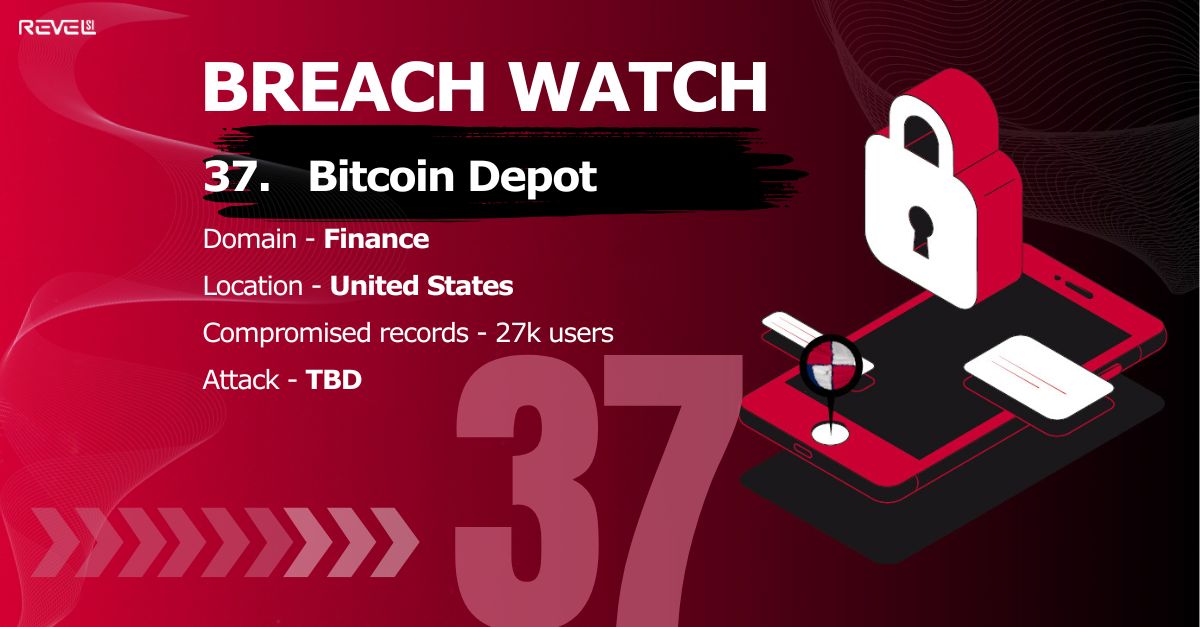Bitcoin Depot Breach: 27,000 Identities Exposed After a Year of Silence

Overview
As Bitcoin experiences a new wave of mainstream attention - fueled by ETF approvals, institutional adoption, and price rallies - more everyday users are stepping into the world of crypto. ATMs like those operated by Bitcoin Depot have become a key access point for casual investors and first-timers looking to buy or sell digital assets without setting up complex online wallets.
But behind that ease of access lies a less obvious risk: centralized personal data collection.
In July 2025, Bitcoin Depot - one of the largest cryptocurrency ATM networks in North America - disclosed a data breach that had quietly exposed the personal information of nearly 27,000 users.
The breach itself occurred over a year earlier, in June 2024. During that time, customers were unaware that their most sensitive personal details - names, addresses, birth dates, and even driver’s license numbers - had been stolen and potentially circulated.
This incident not only raises concerns about how user data is stored and protected, but also casts a shadow over crypto’s growing reputation as a secure and modern financial alternative.
How It Happened
On June 23, 2024, Bitcoin Depot detected suspicious activity on its internal systems. An investigation confirmed that an unauthorized actor had gained access to a server storing sensitive user data. The breach included the type of information typically collected for Know Your Customer (KYC) compliance - names, home addresses, birth dates, email addresses, phone numbers, and copies of government-issued ID.
The company reportedly concluded its internal investigation by mid-July 2024, but did not alert the public or affected customers. Instead, they complied with a request from federal law enforcement to delay notification while authorities conducted their own probe.
Fast forward to July 2025 - an entire year later - and Bitcoin Depot quietly submitted disclosure notices to state authorities, including the Maine Attorney General’s Office. Only then were customers officially informed.
Risks to Users
For the individuals affected, the risks are serious - and they’re compounded by the delay in disclosure.
With full identity data in hand, attackers have the tools to commit identity theft, open fraudulent accounts, or target victims with tailored phishing and social engineering campaigns. Worse, because the breach remained secret for 12 months, some users may already be experiencing the fallout without knowing its source.
This isn’t just an email password leak. We're talking about information that forms the backbone of modern identity - and it’s now out in the open.
Remediation
Bitcoin Depot's response has drawn criticism, not only for the late disclosure but also for the minimal remediation it offered.
Customers were advised to monitor their financial statements and credit reports, remain vigilant, and consider taking precautions like freezing their credit. But no credit monitoring or identity protection services were provided -no support in navigating the risks they now face alone.
The company claims to have addressed the vulnerability that enabled the breach, though it has not shared details about the nature of the exploit. Industry observers suspect a misconfigured GitLab server may have been involved, but Bitcoin Depot has not confirmed this.
The lack of transparency adds another layer of frustration for those affected. Trust, once broken in these matters, is hard to restore.
Conclusions
The Bitcoin Depot breach highlights a growing contradiction in the crypto world. While cryptocurrencies promise anonymity and decentralization, platforms that bridge crypto with fiat systems - like ATM networks - are increasingly collecting centralized user data for compliance. And when that data is mishandled, the damage feels anything but decentralized.
This incident is a wake-up call. Companies handling sensitive identity information must treat it with the highest level of care, from infrastructure security to incident disclosure policies. And when they fail, users deserve more than a heads-up and a pat on the back - they deserve protection, transparency, and accountability.
If you used a Bitcoin Depot ATM in 2024, now’s the time to take action. Review your credit history, monitor for suspicious activity, and consider placing fraud alerts. Don’t wait for the next surprise.
